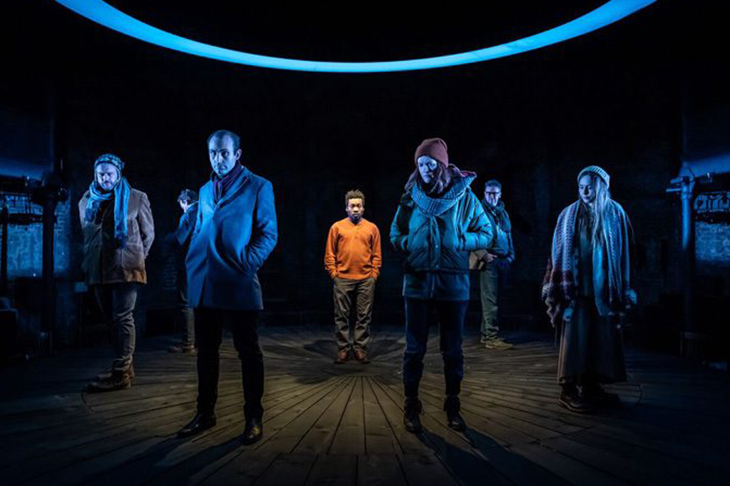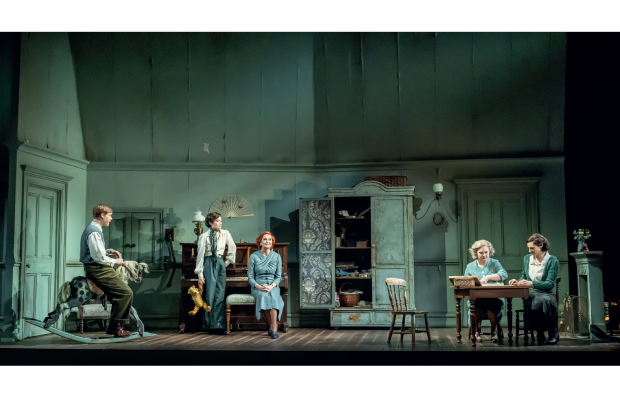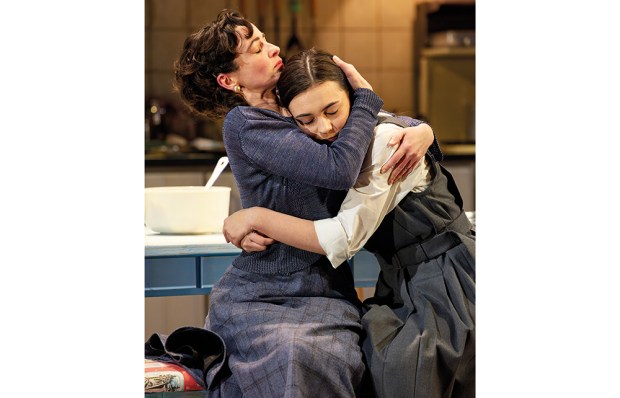When reviewers call a work ‘important’ they mean ‘boring’ and ‘earnest’. And in those terms Shipwreck is one of the most ‘important’ shows I’ve ever seen. It’s not a play but a series of monologues and conversations spoken by a group of American liberals stuck overnight in a rural farmhouse. ‘It’s a red zone,’ they shudder when they learn that they’re in a Republican county. They pass the night carping loftily about the faults of Trump’s campaign and of his presidency between the inauguration and his dismissal of James Comey on 9 May 2017. It’s unclear why this arbitrary time period is chosen, and by ignoring more recent events the characters make themselves seem ill-informed and detached from reality. A political show should stay in touch with politics. None of the characters has any dramatic purpose other than to wallop Trump and co. by asking each other loaded questions. How much does he lie? Might his presidency be likened to the mass suicide at Jonestown in 1978? Has Ivanka overplayed her role as a mom? Is Trump the Antichrist?
The gang of right-on chums are worried that their social group includes no ethnic minorities. One asks: if whites are discussing blacks with no blacks present are whites implying that blacks are imaginary? Their overeducated pessimism is enlivened by disobliging attacks on women. ‘I have a hard time hating Ivanka completely,’ says a female character. ‘She’s an abomination before the Lord,’ notes another sister. ‘I think God hates Ivanka.’ They discuss Hillary’s ‘crimes’, including the alleged murder of 100 political opponents. ‘I don’t believe a word of it,’ says one, ‘but in a way I wouldn’t put it past her.’
These think-tank scenes are interrupted by appearances from the hick farmer who once owned the property and his black son, adopted, rather improbably, from a Kenyan orphanage in the 1980s. Both the African kid and the farmer talk in exactly the same strain of tortured self-examination as the left-wing chatterboxes. At the end of each half there’s a lengthy sketch in which Trump appears as a Satanic malignancy. Both sketches could do with a) a trim and b) a joke.
After three hours my brain felt dangerously under-oxygenated and my right leg had seized up on the Almeida’s unforviging seats. This torpid seminar will certainly persuade any sane play-goer to stay at home and yet, without meaning to, it delivers an important truth about Trump’s opponents. They’re so bewitched by the President and, more significantly, by their reaction to his vices that they’re in danger of facilitating his re-election. Like the insulation around a cable, they don’t carry the charge, they deliver it. Every moment that they spend scrutinising their exquisite disdain for their enemy is a moment lost in the search for arguments that might defeat him. A Trump victory in 2020 may give the Democrats what they secretly crave: moral purity, superiority and no responsibility.
Berberian Sound Studio is a deliberately weird play aimed at technical geeks. In the 1970s an English sound engineer, Gilderoy, is hired by an Italian post-production studio to complete the dubbing for a religious sex flick involving exorcism. Gilderoy must find the right sound for a dying witch. The show has been adapted for the stage by panto writer Joel Horwood, and it’s full of gags about sonic wizardry and technical hacks. Snapping celery, for example, makes the same noise as a human bone breaking. As you’d expect, the soundtrack is complex, detailed and masterfully achieved. Tom Brooke, as Gilderoy, gives an eye-catching account of hesitant nerdy charm. He’s a real find.
But is there an audience for a show targeted at sound technicians with a fondness for anti-Catholic porn films made overseas four decades ago? Much of the dialogue is untranslated from Italian. The 1970s is suggested with predictable platitudes: big hair, flared trousers, droopy moustaches and oafish men leering at simpering young actresses who giggle and pout. It’s hard to feel involved in Gilderoy’s central mission to simulate the shrieking of a witch facing execution. Even non-experts will suspect this is a bogus challenge. And all the relationships are duds. Gilderoy has to deal with two actresses, a grumpy manager, a weirdly charismatic film director and his own mother, at home in England, whose words are relayed via tape. None of these relationships leads anywhere and the climax — which I didn’t entirely follow — involved flashing lights, yelling, self-harm and bloodshed. The spillages may have been faked.
Director Tom Scutt has done well to persuade the Donmar’s boss, Josie Rourke, to let him mount an experimental folly that disregards the interests of most play-goers. Like the embarrassing Cate Blanchett play at the National, this is another hoax perpetrated on the public by out-of-touch producers and their useful idiots at the Arts Council.
Got something to add? Join the discussion and comment below.
Get 10 issues for just $10
Subscribe to The Spectator Australia today for the next 10 magazine issues, plus full online access, for just $10.
You might disagree with half of it, but you’ll enjoy reading all of it. Try your first month for free, then just $2 a week for the remainder of your first year.














Comments
Don't miss out
Join the conversation with other Spectator Australia readers. Subscribe to leave a comment.
SUBSCRIBEAlready a subscriber? Log in